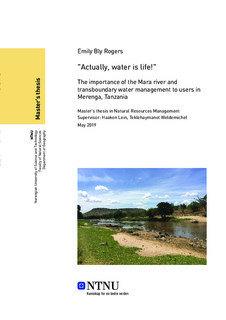Sammendrag
This study examines the importance of the Mara river and other water resources to humans and wildlife in Merenga village in the Mara River Basin (MRB) of Tanzania, as well as how the ways in which local, national, and international authorities choose to manage water resources impact people’s daily lives. The importance of the river is examined through historical, conceptual, and institutional lenses which position the study of water resources in the MRB in current discourses about water management. In doing so, the study examines the disconnect between local use and national and transboundary management that currently exists in the Tanzanian section of the MRB by examining differences that exist between household dependency on and perspectives of the river and the current management plans. The study finds that while the river is of the utmost importance to small communities that live along it, the dependency these communities have on this water resource has been overlooked by high-level managers. Furthermore there is a disconnect between local perceptions and transboundary management that has hampered the implementation of several management plans for the MRB. The study concludes that bridging the gaps that exist between dependency, perceptions and management is a key step toward the vitally necessary sustainable transboundary management of the MRB.
